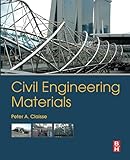Civil engineering materials / Peter A. Claisse.
Material type: TextPublisher: Amsterdam : Butterworth-Heinemann, 2016Description: xxxii, 496 pages : illustrations ; 24 cmContent type:
TextPublisher: Amsterdam : Butterworth-Heinemann, 2016Description: xxxii, 496 pages : illustrations ; 24 cmContent type: - text
- unmediated
- volume
- 9780081002759
- 624 CL.C 2016 23
- TA404 .C52 2015
| Item type | Current library | Collection | Call number | Status | Date due | Barcode | |
|---|---|---|---|---|---|---|---|
|
|
The Knowledge Hub Library | Engineering | 624 CL.C 2016 (Browse shelf(Opens below)) | Available | 190040 | ||
|
|
The Knowledge Hub Library | Engineering | 624 CL.C 2016 (Browse shelf(Opens below)) | Available | 190041 |
Includes Index
Units -- Strength of materials -- Failure of real construction materials -- Thermal properties -- Pressure -- Electrical properties -- Chemistry of construction materials -- Properties of fluids in solids -- Transport of fluids in solids -- Transport of ions in fluids -- Ionising radiation -- Variability and statistics -- Use of test results -- Specifications and standards -- Reporting results -- Testing construction materials -- Introduction to cement and concrete -- Cement and cement replacement materials -- Aggregates for concrete and mortar -- Hydration of cement -- Concrete mix design -- Testing wet and hardened concrete -- Creep, shrinkage, and cracking of concrete -- Admixtures for concrete -- Durability of concrete structures -- Production of durable concrete -- Assessment of concrete structures -- Mortars and grouts -- Special concretes -- Steel -- Corrosion -- Alloys and nonferrous materials -- Timber -- Masonry -- Plastics -- Glass -- Bituminous materials -- Composites -- Adhesives and sealants -- Comparison of different materials -- New technologies.
"Civil engineering materials explains why construction materials behave the way they do. It covers the construction materials content for undergraduate courses in civil engineering and related subjects and serves as a valuable reference for professionals working in the construction industry. The book concentrates on demonstrating methods to obtain, analyse and use information rather than focusing on presenting large amounts of data. Beginning with basic properties of materials, it moves on to more complex areas such as the theory of concrete durability and corrosion of steel."
There are no comments on this title.

